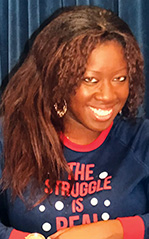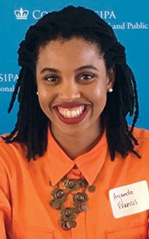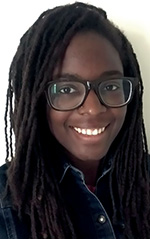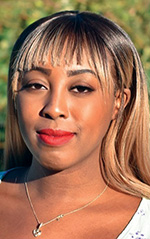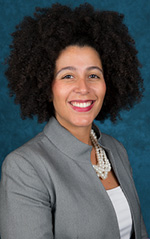Female, (Won’t) Curtail & Yale: Waiting to Exhale
Speaking Out
Reflections on race and service from six Black women working at the State Department
BY SAMANTHA JACKSON, AYANDA FRANCIS-GAO, LISA-FELICIA AKORLI, AJA KENNEDY, ANNAH MWENDAR-CHABA AND TESSA HENRY
Speaking Out is the Journal’s opinion forum, a place for lively discussion of issues affecting the U.S. Foreign Service and American diplomacy. The views expressed are those of the author; their publication here does not imply endorsement by the American Foreign Service Association. Responses are welcome; send them to journal@afsa.org.
Since the May murders of Breonna Taylor and George Floyd, discussion about racism has filled the halls of the State Department. Many Black Foreign Service officers have received words and actions of support from our non- Black colleagues. But we’ve also heard voices of disbelief and denial and seen delay and lack of action, implying that incidents of racism at State, and in the United States generally, are one-offs or not a priority to address.
We are writing now to reassert that, unfortunately, racism is and has always been the systemic rule, not the exception. In 1946 Secretary of State Dean Acheson warned that the “existence of discrimination against minority groups in this country has an adverse effect on our relations.” Sadly, this remains true. Racism needs to be acknowledged and addressed as a priority at all levels.
As Black, female, Ivy League graduates and members of the Foreign Service, we feel a responsibility to disrupt the good ol’ (white) boys’ club stereotype of the FSO (“Pale, Male and Yale”) that lingers, ghostlike, around the State Department. In the interest of making progress toward genuine diversity and inclusion, and to amplify the voices of the Breonnas and Tiannas, we share here a few of our stories and perspectives on racism at State.
Samantha Jackson
If I didn’t define myself for myself, I would be crunched into other people’s fantasies for me and eaten alive.
—Audre Lorde
Ugh. That’s not even an overstatement. If you are a Black professional and you do not fit the fantasized stereotype living in some minds, you are “confusing.” If you are anything like us, Black female FSOs with Ivy League degrees, prepare for acute reminders of your difference. The seemingly innocuous reminder can come in the form of the side-eye or the microaggressive incoherent insinuation that your achievement is somehow at odds with your race: Voilà—The White Black Girl. Apparently, it is a thing.
That State has historically struggled to retain talented Black officers is discussed ad nauseam, but the idea that its hostile culture hemorrhages talent, provoking Black FSOs to resign citing racism and isolation in predominantly white spaces, is not. For those of us who remain, the Herculean task of dragging the margins into the narrative rests on our shoulders. As diplomats who take the advancement of American ideals seriously, we are uniquely positioned to offer perspective and provide solutions, yet our expertise all too often goes untapped.
We are the cohort who grew up to the “Waiting to Exhale” movie soundtrack of Toni Braxton, Whitney Houston, SWV and Babyface hits. We are the generation who witnessed 9/11 in grade school and came of legal age to vote in the historic election of the first Black president. We’ve completed our first tours and are waiting to exhale. But this time it’s not a soundtrack; rather, we aim to track a sound response to State’s incessant delay in unambiguously committing to meeting the needs of all employees. Perhaps you were drawn in by the audacity of this article’s intriguing title, and perhaps you now understand why.
Over to you, Ayanda…
Ayanda Francis-Gao
“I can’t breathe.” The famed last words of Black people dying at the hands of the police in state-sanctioned (or at least condoned) violence is relevant to the experience many people of color—particularly Black women—face in the State Department. Our nation’s oldest agency lives up to its “Pale, Male and Yale” legacy by systematically pushing Black people consciously and subconsciously out of its ranks. Death by a thousand cuts. Some of us begin our careers praised for our ingenuity, only to go from “office pet” to “office threat” in an instant. Others are disparaged from the start: our experiences ignored, and our knowledge undervalued.
We face overt racial and sexual discrimination outside our embassies—guards refusing to let us into our residences; not being perceived as American at all, much less diplomats—and covert discrimination within. In one unforgettable example, the Marine staff sergeant on duty with whom I regularly interacted gruffly asked if I was a “blue badger [American] or yellow badger [local staff]” in an embassy with fewer than 40 U.S. direct hires and fewer than 10 Black U.S. direct hires.
After suffering injustice from all sides, we are then expected to do our day jobs, as the adage goes, “twice as good to get half as far.” It is no wonder then that in a career whose expectation is that employees are working 24/7 to represent the United States, simply trying to survive can feel like treading water, lungs slowly filling as you lose oxygen.
Like treatment for serious wounds, addressing racism first requires a true understanding of the damage’s extent, followed by disciplined, regular and dedicated action. Racism of all kinds and at all levels at State will not fade with listening sessions and unconscious bias training alone. Department bidding, hiring, tenure, promotion and awards policies should be reviewed and changed to increase transparency. Offenders (particularly repeat ones) should be held accountable for their actions, not simply shuffled around and whispered about. Corridor Reputation™ should not shield bad actors and shame victims into silence.
“I can’t breathe.” With a thousand cuts, at least the extent of the wounds is clear and indisputable. Suffocation can happen slowly enough that even the dying may not recognize their condition.
Over to you, Lisa-Felicia…
Lisa-Felicia Akorli
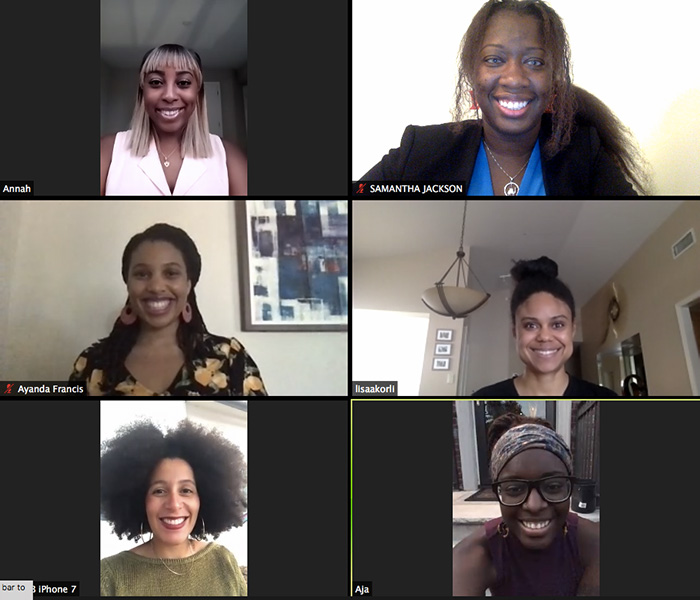
A screenshot of the authors in a Zoom conversation in September.
I’m pretty sure that when I am in the United States, people who don’t know me see me as an African American woman. But I’m not, technically. That is, my ancestors were not enslaved. I am a naturalized U.S. citizen, born to a Ghanaian father and Dutch mother. My dad grew up in Ghana, in a village where our last name is well known. My mom was Dutch and grew up in the Netherlands. In the early 1990s, when I was a toddler, she won an immigrant visa through the Diversity Visa program and raised me as a single parent in Scottsdale, Arizona. She didn’t know much about the history of racism in the United States and so never talked to me about discrimination.
One anecdote illustrates how naive my upbringing was. Soon after my mom and I moved to Arizona, one of her sisters (my aunt) followed. Coincidentally, she also had a half-Ghanaian child, my cousin Quincy. In high school Quincy let me borrow his car one day. When I went to my aunt’s house to pick up the keys, she said to me, in complete earnest: “Just be careful. There’s something about that car. Quincy always gets pulled over.” Years later, after I had begun college, where conversations about race were common, I realized that the car wasn’t the problem.
Racism in the United States is obviously a grotesque injustice. But when it comes to my personal experience, it feels really complicated. Quincy always got pulled over; I never did. When I think back on my life, it’s hard for me to identify moments where I was clearly being discriminated against. I have to imagine that it has happened. But to say that I feel it often would be disingenuous. And writing that last sentence feels somehow like I’m betraying my African American friends and colleagues who have clear-cut, heinous examples of being victims of racism.
Basically, racism in America is complex. Before writing this piece, I talked to Sam, one of my sisters in diplomacy. I told her my perspective and that I didn’t want to diminish or muddle the message. She encouraged me to write anyway, saying that the nuance and complexity of our diverse experiences is worth sharing. So here we are.
Is racism a problem in the Foreign Service? Certainly. But you’re not going to get a scandalous personal account from me, because I’m not sure I have one; and if I do, it went over my head.
Over to you, Aja…
Aja Kennedy
In the same way all diplomats adapt to local cultural quirks when serving overseas, Black women in the professional world must learn unspoken rules when we step into white spaces. We are used to being on the “margins” before we even begin A-100. By the time we become FSOs, discomfort has become almost routine. But one advantage it gives us is the ability to look at the culture of the department with a critical eye. Perhaps this less glamorous perception of the Foreign Service career is what leads some of our peers to decide to cut the journey short and pursue other professional avenues instead.
We want to be clear: Although we have decided to remain with the department through this difficult time, we strongly support the women who speak up and make the difficult decision to leave. They are our close friends and colleagues. Many of us who serve are holding our breath until the day we can feel comfortable in a committed relationship with the State Department—the women who left just got tired of waiting and wanted to exhale now. They couldn’t breathe.
My colleagues and I know our worth, and we’ve worked hard to gain the opportunity to serve our country in the diplomatic corps. We are honored to support our colleagues in serving the American people. At the same time, we are disappointed that the risk-averse nature of the agency and the “corridor reputation” boogeyman all but eliminate the kind of candor needed to have an honest conversation about race. The levels of bureaucracy and slowness to change is disheartening for those of us who want to see a stronger department that truly embraces its diversity and uses that asset to its fullest. Working to make this change is a tall order, but we don’t have an option. We, as a department, have to fix it.
The events of recent months have encouraged some of us to be more outspoken about our experiences. I’ll be honest—as a cautious entry-level diplomat, I haven’t always spoken up. I’ve had conversations with more senior leadership who share similar self-critiques. But if we want to change, the time is now. It seems people are listening, at least for the moment.
Over to you, Annah...
Annah Mwendar-Chaba
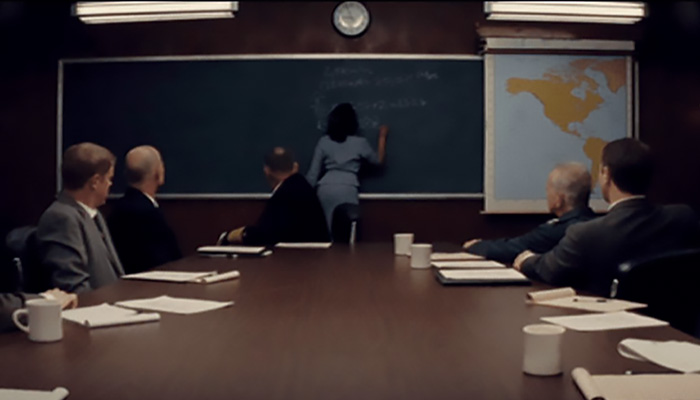
“Class is adjourned,” a still image of an animated GIF from the award-winning 2016 film “Hidden Figures.”
giphy.com / Hidden Figures
I am the America-born child of immigrants from Kenya, and my experience of racism in the U.S. has been one of learning and teaching, evolving from a perspective of naiveté to resolution.
I was blessed to have a stable upper-middle class family, which presented me opportunities to excel and the resources and support to chase my dreams, including attending an Ivy League institution. I learned to look back on the moments of discrimination I faced—whether for being a girl, “not American enough” or because of my race—with hope and reaffirmation because thriving in spite of these moments was a testament to my destiny and our evolution. Simultaneously, I developed a deep call of duty to amplify the voices of these different groups I was identified with who are systematically marginalized and disadvantaged. All in hopes of a reckoning.
I first experienced the duel of reckoning and hope after listening to my second-grade teacher read a story about the friendship of a Black boy and a white boy during the Reconstruction era. My 8-year-old self realized that for some reason in America’s history, any person with skin the color of a brown crayon was hated and treated worse. I was the only child in that classroom with beautiful soft skin the color of a brown crayon. Everyone else, including my teacher, had skin the color of an apricot crayon; I started to cry.
My teacher held me on her lap, and my classmates crowded around us, hugging us and patting my back in silence. We could all understand that this was a painful story, a truth that required acknowledgment, reconciliation and restoration. At that moment, I was hopeful. As I’ve grown and learned more, it has become more challenging to maintain that hope.
How can our nation—founded on such revolutionary ideals and values and an inspiration to peoples from all around the world—not be able to reconcile with one of our earliest and foremost wrongdoings? When will we finally and wholly live up to our professed ideals? When will we reckon?
I believe our time of reckoning is now, and always will be now. I hope we can all do the work that is needed to expand our individual worldviews, leverage and embrace the diversity around us, and be part of a community and organization that is truly committed to equal opportunity for all, not just in word but through equitable and anti-racist internal policies.
Over to you, Tessa…
Tessa Henry
“You are brave to wear your hair like that to work.” I looked up, and the woman was smiling at me. It wasn’t the first time I’d experienced unconscious bias regarding my natural curls. Still, I couldn’t help but pause. Why was my natural hair, in its natural state, “brave”? And, where do these associations for black hair come from?
This incident is exemplary of the many racist and discriminatory incidents that happen in the United States every day. Unconscious biases based on social stereotypes about certain groups are formed by individuals outside their own awareness.
To truly appreciate the implications of that woman’s comment, one has to deal with a broader problem in American culture: history, and our failure to understand it. As James Baldwin said: “History is not the past. It is the present. We carry our history with us. We are our history.”
Many Americans were shocked by the killing of George Floyd and police brutality. However, if you understand history, you would not be surprised. During Reconstruction, the role of the police was to terrorize Black communities. The targeting of Black communities continued through the Jim Crow era. Fast-forward to the 21st century, and we see the serious implications this had for housing, educational opportunities, the justice system and access to equal employment.
Like skin color, black hair is often associated with negative connotations—“kinky” or “rebellious.” As I stared back at this woman, I realized she did not even understand the historical implications of her discriminatory remarks. Black hair is often the target in misconceptions of beauty in America. This was nothing new.
The State Department took a step to address racism and discrimination in its workplace with the Foreign Service Institute course, “Mitigating Unconscious Bias.” Take it. However, I encourage my friends, colleagues and family members to go deeper. Explore the why. Why is police brutality ongoing? Why are microaggressions so common? Why are only four of the 189 U.S. ambassadors serving overseas Black?
The effects of history and racism are still present today. We need to understand the why to fully address these challenges moving forward.
HAIR (HERE) TO STAY.
Read More...
- “Making Diversity and Inclusion Real in Foreign Affairs: Reports from the Employee Affinity Groups,” The Foreign Service Journal, October 2020
- “Inclusion Helps Drive Diversity,” by Mirembe Nantongo, The Foreign Service Journal, September 2020
- “Diversity at State: A Dream Deferred and a Collective Responsibility,” by Ana Escrogima, Lia Miller, and Christina Tilghman, The Foreign Service Journal, September 2020

